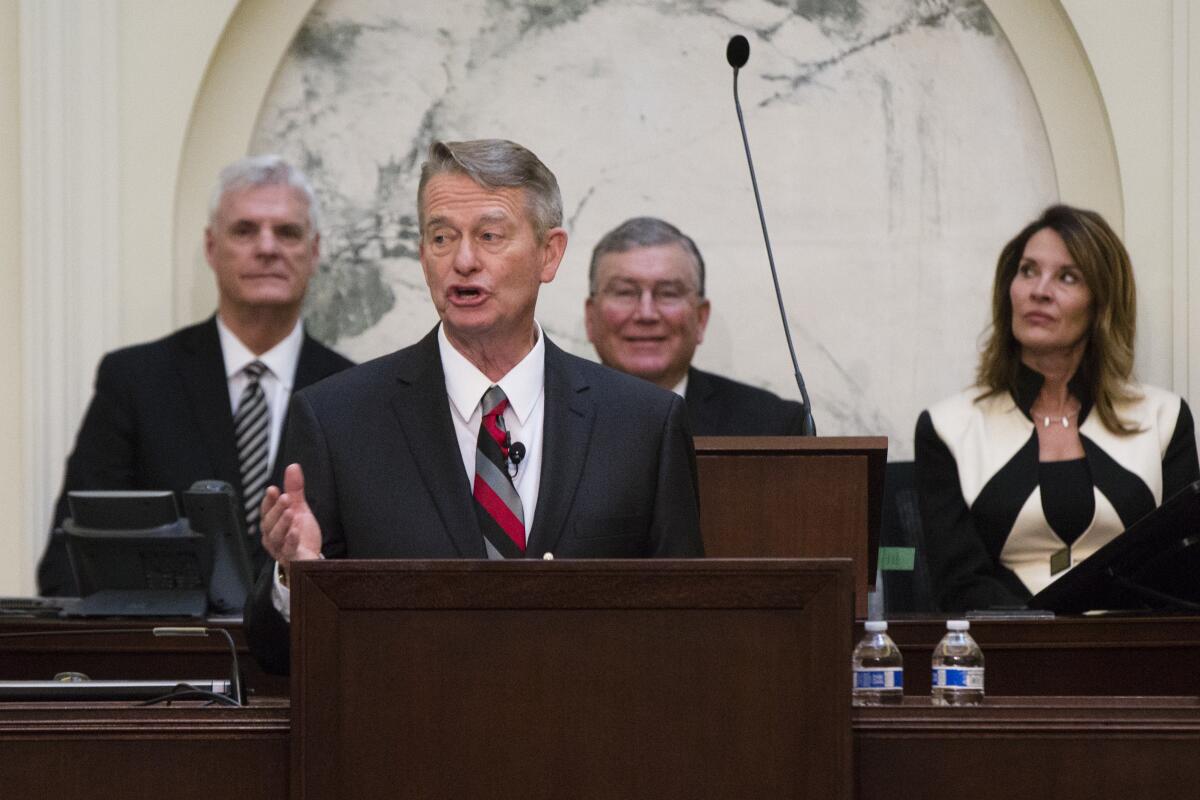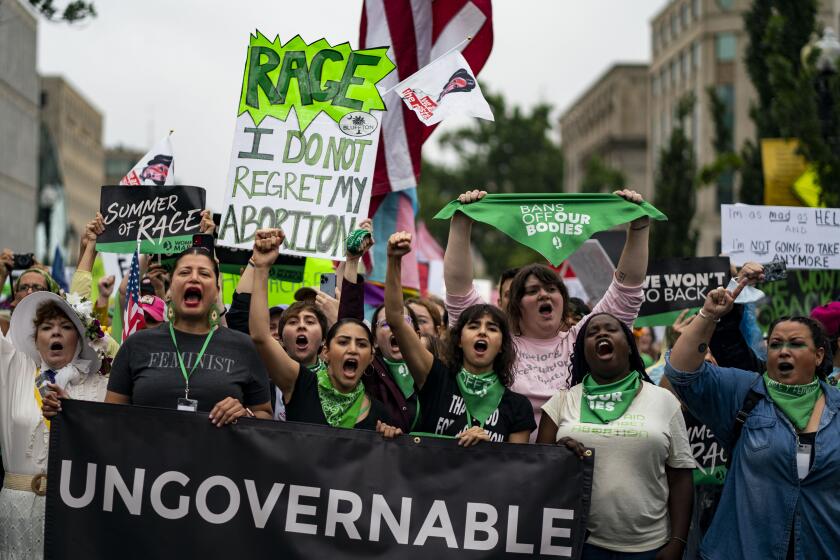Column: Red states are threatening to criminalize out-of-state abortions. These blue states are fighting back

Back in May, the Legislature and governor of Idaho conceived of a new crime, which they called “abortion trafficking.”
The supposedly trafficked victims were pregnant minors who don’t want their parents to know they’re seeking an abortion. The state made it illegal for anyone to help them obtain an abortion, including by medical means, as well as “recruiting, harboring, or transporting the pregnant minor” within the state. The law calls for jail terms of two to five years.
The law also empowers many members of the minor’s extended family — parents, siblings, the minor’s other children — and the father of the unborn child — to sue even out-of-state abortion providers for damages of $20,000 or more.
If you’re a doctor in California, the chilling effect means that every time you see a patient, you have to wonder what state are they from, and are they telling you the truth?
— Mary Ziegler, UC Davis School of Law
The law is a companion piece to Idaho’s almost total abortion ban. One of the harshest anti-abortion bans in the country, the law criminalizes abortions under almost all circumstances.
It was passed in 2020, to be “triggered” once the U.S. Supreme Court overturned the abortion protections established by its 1973 decision in Roe v. Wade. That happened with the court’s infamous June 2022 decision in Dobbs vs. Jackson Women’s Health Organization.
Get the latest from Michael Hiltzik
Commentary on economics and more from a Pulitzer Prize winner.
You may occasionally receive promotional content from the Los Angeles Times.
Not long after the ban was triggered, neighboring states and other abortion-rights states noticed a surge in patients from Idaho. In Washington, clinics saw a 75% increase in Idaho patients; in some clinics near the Idaho border, 4 out of 5 patients are Idahoans. Oregon providers saw a surge of as many as 300 new patients a month.
So it may be unsurprising that the anti-abortion crusaders in Idaho’s state government have moved to restrict even traveling out of state for an abortion.
Blue states, however, are fighting back. Nineteen attorneys general of blue states (including Rob Bonta of California) have signed onto a friend-of-the-court brief in a lawsuit filed in July by abortion advocates in Boise federal court seeking to overturn the law as an unconstitutional infringement on the right to interstate travel. (The attorney general of Washington, D.C., has also signed on.)
The blue states assert that the Idaho law’s reach extends far beyond the state’s borders. The law, their brief says, “threatens to punish, and will chill, the ability of healthcare providers, counselors, and trusted adults” to provide their Idaho patients with “vital information and support about lawful healthcare” in their states.
They raise an important point. The Idaho law is an example of how anti-abortion fanatics aren’t inclined to stop at merely throwing the healthcare systems of their own states into chaos. They want to create the same anarchy nationwide. Travel restrictions are a tool in their arsenal.
Over 20 years, the anti-HIV program PEPFAR has saved millions of lives globally. The antiabortion movement is using lies and hysteria to oppose its renewal
Idaho’s law is the only such statute now, says Mary Ziegler, an expert on the law and politics of reproduction and healthcare at the UC Davis School of Law. “It’s worth emphasizing that it’s not likely to remain the only one. We’re seeing the tip of the iceberg.”
The disruption is not imaginary. In March, Bonner General Hospital in Idaho’s northern panhandle announced that it would end labor and delivery services because “bills that criminalize physicians for medical care nationally recognized as the standard of care” had driven its OB/GYN and pediatrician doctors away. Pregnant women would henceforth have to travel 46 miles for the nearest hospital obstetric services.
One device the drafters of the Idaho trafficking law employed to sow confusion is ambiguity. The law doesn’t define “recruiting” or “harboring,” or clearly set forth where liability ends and immunity to its provisions starts. If a woman in Pullman, Wash., tells her pregnant niece in Idaho where she can find a clinic in Washington, the blue states ask in their brief, “is that ‘recruitment’”? If the aunt pays for her niece’s bus ticket, “is that ‘transportation’ — or, as the Idaho law would have it, ‘trafficking’?”
The threat of civil liability poses “pretty formidable practical concerns,” Ziegler says. “If you’re a doctor in California, the chilling effect means that every time you see a patient, you have to wonder what state are they from, and are they telling you the truth?”
The Idaho law fulfills the grim prediction of the Dobbs dissent of Supreme Court Justices Elena Kagan, Sonia Sotomayor and Stephen G. Breyer that interstate restrictions will “soon be in the offing.... Some States may block women from traveling out of State to obtain abortions, or even from receiving abortion medications from out of State. Some may criminalize efforts, including the provision of information or funding, to help women gain access to other States’ abortion services.”
The Idaho law makes a mockery of the assurance by Justice Brett M. Kavanaugh, in his Dobbs concurrence, that no state would be able to bar a resident from traveling to another state for an abortion, due to “the constitutional right to interstate travel.”
One indication of the chaos is that the red states can’t get even their own story straight. In June, 19 red-state attorneys general wrote the Department of Health and Human Services by letter to protest a proposed HHS rule prohibiting the disclosure of personal healthcare information to authorities in non-abortion states investigating abortions performed for their residents in states where they’re legal.
A puritan crusader got Congress to pass an anti-obscenity law in 1873. Antiabortion activists have resurrected it for their own purposes.
The proposed rule would block the disclosure of information sought for a “non-health care purpose,” such as “a criminal, civil, or administrative investigation” of any person connected with out-of-state reproductive healthcare that is legal in the state where it was provided. That sounds as though it would cover people, including out-of-state residents, who might be prosecuted in Idaho for “recruiting,” “harboring” or “transporting” minors subject to the law.
According to the letter, which was instigated by Mississippi Atty. Gen. Lynn Fitch, the Biden administration was pushing “a false narrative that States are seeking to treat pregnant women as criminals or punish medical personnel who provide lifesaving care.” The letter called that narrative a “lie.”
Is that so? Not a few cases in which pregnant women are treated as criminals or threatened with prosecution have arisen in anti-abortion states.
In South Carolina in March, a woman was arrested and charged with having induced her own abortion with medication. South Carolina Atty. Gen. Alan Wilson signed the red states’ letter. Last month in Nebraska, a 19-year-old woman was sentenced to jail for the crime of disposing of her fetus after an abortion, a transparent effort to prosecute her for the abortion itself. Nebraska Atty. Gen. Mike Hilgers signed the letter.
In Alabama, as the indefatigable abortion rights advocate Jessica Valenti reports, the office of Atty. Gen. Steve Marshall has let it be known that the state’s chemical endangerment law, which purportedly protects unborn fetuses, could be wielded against women who undergo medication abortions. Marshall signed the letter.
In Texas last year, a 26-year-old woman was charged with murder after a “self-induced” abortion. The charge was ultimately dropped. Texas’ acting attorney general, John Scott, signed the letter.
As for seeking to “punish medical personnel,” the Idaho law, thanks to its manifold ambiguities, raises exactly such a prospect. Idaho Atty. Gen. Raúl Labrador signed the letter.
One open question is why the conservative states are so determined to maintain their access to out-of-state medical records.
The fact that the conservative attorneys general are fighting the HHS rule “suggests that there’s interest in using out-of-state medical records, even if we haven’t seen that happen yet,” Ziegler says.
The Fugitive Slave Act of 1850 was America’s most detested law. Why are some anti-abortion states trying to duplicate it?
Their letter doesn’t make much of a case for the records’ importance. It offers an example in which “state officials had reason to believe that an abortion provider deliberately performed an abortion in violation of state law ... and referred the woman to an out-of-state provider to cover it up.”
State officials would have grounds to investigate the provider, the letter says. The purportedly illicit activities, however, would have occurred in-state, not outside their state lines.
The states also suggest that blocking them from obtaining out-of-state medical records might prevent them from investigating child abuse. But the HHS rule protects information related to activities that are illegal inside a state but lawful in another state. “There are no states that I’m aware of where child abuse is legal,” Ziegler says.
The red states also say the proposed HHS rule would hamper their efforts to block gender-affirming care for adolescents. That might seem a positive outcome (unless you’re a red-state anti-transgender fanatic).
As Ziegler says, this is only the start of what the Dobbs ruling, abetted by fanatical legislators, has unleashed. California and other blue states have taken steps to cement abortion rights into their laws and constitutions and to protect their healthcare providers from harassment from out of state, but their task is not going to get any easier.
More to Read
Get the latest from Michael Hiltzik
Commentary on economics and more from a Pulitzer Prize winner.
You may occasionally receive promotional content from the Los Angeles Times.














